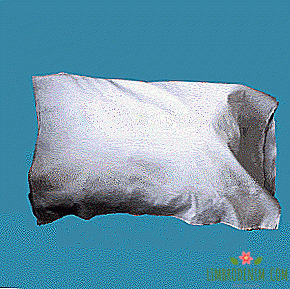"Prison for the elderly": Is it possible to send relatives to nursing homes
"THE HOUSE OF THE ELDERLY" IN RUSSIA SOUNDS, as the threat of tragic old age. In the public mind, this is something like a "prison for the elderly", where children and grandchildren "refer" to relatives who are tired of. It seems that to leave a loved one in such an institution is possible only in case of trouble - and no one will do it voluntarily. We decided to figure out how people actually get into such houses and what problems arise with it.
TEXT: Anna Sinitsyna

Grandchildren "surrendered" grandmother
The image of children and grandchildren, who “squeeze” relatives into the institution, who have ceased to be “comfortable”, appears first in the conversation about nursing homes. But experts say that this is not the only possible scenario; moreover, it is far from the most common. “We have been helping the elderly for eleven years - and the stories in the spirit of“ the son put his mother in the car and took him to the orphanage ”were almost never met,” said Alexander Kuzmicheva, coordinator of the Old Age to Joy Foundation. “Everyone heard about, for example, selling apartments, while the elderly person was treated for a long time, and the “loving” relatives already hoped that he would not be cured. The fact that the elderly person himself went to the orphanage because he was given a “sweet life” - maybe without physical violence, but psychologically unbearable. But All these stories are individual, and although about nor memorable, such an absolute minority. Not every big boarding school has such a story. "
Not so long ago, Ilya Yashin accused the Moscow mayor's office of harassing his grandmother: materials appeared at once in several tabloids that the opposition politician had left 84-year-old Alexander Dmitrievna in a nursing home, and allegedly seized her apartment. “In addition to the sickening smell, a very oppressive atmosphere reigns here. The rooms are very stuffy,” the private house where Grandma Yashin is located was described in the Life publication. “The old men themselves understand that relatives have passed them here to live out their life and to anyone in this life.” they are no longer needed. They call the nursing home a prison. There is a joke among the old people about the name “Hospitable house of good deeds and evil people.” The only entertainment for the inhabitants is to complain about the staff and gossip. " Yashin even had to explain himself: his grandmother had symptoms of dementia and now she is in a boarding house under the supervision of specialists.
According to Alexandra Kuzmicheva, most of the stories are not at all cinematic. Statisticians in the fund do not lead, but according to expert observations, about 70% of people living in a boarding school have children and grandchildren - most often they live far away and rarely visit their relatives. "The most typical story is about this: our woman is about fifty years old, she lives in the village, and her children have been disaccustomed in the nearest town and are looking for work there," the coordinator says. "First come every weekend, then start a family, rent a house, go into a mortgage give birth to children. " Later, the woman becomes older, but she can still manage the house herself - and if the children call her to live with her, she refuses: she does not want to leave the house and the familiar environment; not everyone is ready and willing to sit with their grandchildren, and not everyone has an ideal relationship with relatives. “In addition to the cliché,“ children have abandoned ”and there are clichés“ why don't you find a corner for mom. ”But an elderly person doesn’t need a“ corner ”in your life - he needs his own world, he is an established personality with his own habits and ideas proper and good, with your favorite TV programs, in the end.Nothing strange that the grandmother from her apartment or house, with which all memories and habits are connected, does not ask to go to the “corner” to “odnushku” on the ninth floor while life. "
"Why then do we not judge those whose grandmothers do not live in a boarding school, but in a distant village, in a house without sewage and central heating, and without a washing machine?"
With age, it becomes more and more difficult for a woman to cope with everyday affairs and to look after her health, but she is also not ready to move in with children: she does not want to burden her relatives and does not feel herself entirely in the way of this family. If relatives cannot care for an elderly person who needs constant attention, he or she goes to boarding school - and if relatives rarely visited them before, then this situation does not change.
“Is it possible to say that family ties are broken? If so, at what point? On the day of the grandmother’s relocation to boarding school or twenty years before? Grandmother usually calls up with her children and grandchildren and is proud of their success,” says Alexander Kuzmichyova. And it’s strange to judge this family. Why then we usually don’t judge those whose grandmothers do not live in a boarding school, but in a distant village, in a house without sewage and central heating, and without a washing machine who knows how to change clothes? "
Among other common scenarios, for example, dementia, when living next to a person becomes difficult or dangerous, or a situation where an elderly person can no longer get out of bed and he or she needs constant care: change posture every two hours to avoid bedsores, follow for drugs and water and so on. Children would like to continue to care for their relatives, but they cannot do this because they have to work and earn. “It’s happening in the provinces, the salaries are not Moscow’s. They start looking for a carer - but they don’t have money for those who are able to do something, and those who don’t have the same results: grandmother’s bedsores, pain, confused consciousness. Some may even bind there is practically no licensed market for trained nurses, and it turns out that we need to either give up work and become a 24-hour carer (and with what money to live?) or entrust care to an institution In an institution, care is often not better. is another matter. "
However, even in situations where the institution seems the only way out, there is no guarantee that neither the elderly person nor his relatives will regret the decision. Louise Smith, author of the column at The Guardian, tells how she was sure that she would never relocate her parents to a nursing home - but after her father had a stroke, it became clear that they needed help. The woman chose a pleasant place for her parents (according to her, three of the four were terrible), but despite the comfortable conditions and the fact that the couple moved things from their home to a new room, it was difficult for them to adapt - and the state of each of them began to deteriorate .
“Now I think I’ve made a terrible mistake of putting my parents in a nursing home, even though it seemed to me that I don’t have a choice. Any employee will tell you that after three months the residents close in themselves and begin to die out rapidly,” says Louise. I am haunted by memories, and I consider it a well-deserved punishment. Dinner carts that are taken out when relatives leave; father’s army melody floating along empty corridors. Christmas, when gifts are distributed (one per person), and you don’t know what’s worse - ignore this measure accepting or pretending that you are celebrating, in a place that you cannot perceive as a home. "

How to live
The drama is that, according to research, elderly guests do, on average, live in boarding houses for a very short time. For example, one of them, conducted on information about 1,817 dead elderly people, showed that, on average, people in nursing homes died at the age of 83.3 years; the median of their stay in the institution was five months, and on average they lived there for 13.7 months (the difference in numbers was explained by the authors by the difference in results for men and women and for people with different income levels). 53% of guests died within six months after relocation. Results remained even after the authors took into account the difference in age, health, and other factors important for the study.
But what matters is not only how much an older person will live, but also what will be the quality of his life. Elderly care systems vary widely across countries. For example, in Japan, where the population is actively aging, the system has traditionally moved towards the organization of care on the part of relatives: the state geriatric organizations were intended primarily for those who have no relatives or savings. From the beginning of the 2000s, the system began to be changed in such a way that the state would actively help the relatives (day care centers, domestic help, nurses coming to the house and short-term hospitalization). True, this approach led to much higher costs than originally planned.
In the United States, nursing homes are called softer, “nursing homes”. Most often, such institutions have round-the-clock assistance to residents, but their formats can be very different from one another: some look like hospitals with nursing posts, others look more like an apartment building with a more relaxed atmosphere, where there is no rigid schedule, and guests can cook for themselves.
In addition, there is also an assisted living system in the country. In fact, this is an "intermediate stage" between the independent life of the elderly and moving to a nursing home: residents live in their own apartments, but they are helped with cooking, cleaning and other things. Residents spend here an average of 2.5-3 years; far from everyone can afford to live in a residence - for example, as early as 2004, living cost an average of 2,100 to 2,900 dollars a month.
In the UK, instead of retirement homes, “care homes” are common - institutions fall into this category not only for the elderly, but also for people with disabilities and orphanages. Payment of stay in them will also not be low, but there is, for example, a deferred payment system - so that older people do not have to immediately sell their own home.
In the case of nursing homes, the issue of care and attention, conditions and comfort is particularly acute. The news regularly includes institutions with very bad or even deadly conditions for guests. For example, this winter, in Perm, after checking prosecutors and ministries, they filed a case against the owners of a nursing home: Human Rights Ombudsman in the Perm Krai, Pavel Mikov, said that during the check, "several deaths occurred amid terrible living conditions." According to a relative of one of the guests, after the complaint, and the case was filed, in the institution, the elderly were beaten, tied to beds and watered with water from a well, which is located next to the sewage system. A year ago, a fire broke out in Krasnoyarsk in a private pension, in which three people died, some of the facility guests could not move on their own. Such high-profile cases are not uncommon in other countries. In nursing homes, they may mistreat or neglect their needs (in a video shot by BBC journalists, an elderly woman screams for several hours and asks staff to help her with the toilet - but to no avail); in some institutions, rape of the elderly has even occurred.
The causes of problems in the care of older people in different countries are common. For example, burnout and staff overloading: caring for older people is hard, undervalued and poorly paid work, regardless of geography. According to experts, the desire to “get rid” of the guests as soon as possible from the staff of the institutions is not (per capita funding and checks are insured), but this does not always save from indifference and incompetence. Many nursing home staff in Russia do not have the necessary knowledge to care for the elderly and have not received professional training. A person without special education and medical skills may treat the guests attentively, but miss serious symptoms and conditions, such as dehydration or a sharp jump in temperature.
"Any worker will tell you that after three months, the residents close in themselves and begin to die out rapidly"
Poor funding contributes to poor funding (in the UK, due to low wages in some nursing homes, staff may change every four weeks): in a situation where staff lacks basic care, they often lose motivation.
Contrary to popular belief, there are no free nursing homes in Russia: government agencies take a significant portion of their pension benefits, most often 75%. The quality of care often directly depends on funding. For example, in the well-known network of private guesthouses, the Senior Group focuses on the experience of Israeli specialists - they strive to ensure that each of the guests becomes mobile to the best of their abilities, provide a comfortable environment, give guests the opportunity to communicate not only with doctors, but also, for example, with a psychologist. In this case, the cost of living in a boarding house is one hundred thousand rubles per month and above. Finding a private geriatric center that is consistent with the principles of evidence-based medicine and with well-equipped facilities, with a lower price tag is difficult. Those who cannot afford such expenses will most likely have to sacrifice in part the comfort of a loved one. In this case, it is possible that even in the most comfortable conditions a person may perceive the boarding house as a prison, be angry with relatives and do not want to live there.
There are more questions than answers in how to set up an elderly care system. Is it really better for an elderly person to live in the company of people of his own age so that he can communicate with someone — or is it more important to stay in the same place, in usual and comfortable conditions. What should be done first of all to improve the system of geriatric care - and so that more people can provide their relatives with the comfort and level of care they need? “The support of families caring for older people and people with disabilities is absolutely necessary: the nursing services of trained nurses, kindergarten schools, day care centers, better provision of rehabilitation facilities. And it is absolutely necessary to improve care in institutions,” said Alexander Kuzmichyova.
Perhaps the only point that is beyond doubt is that the decision on how to proceed cannot be made alone; Each case is unique, and in each it is necessary to put at the forefront of the most elderly person and his interests.
PHOTO: schankz - stock.adobe.com, SusaZoom - stock.adobe.com





